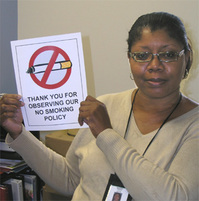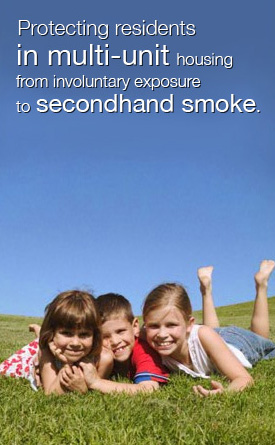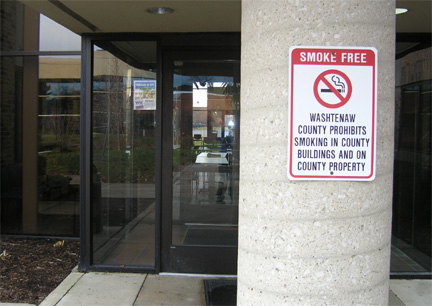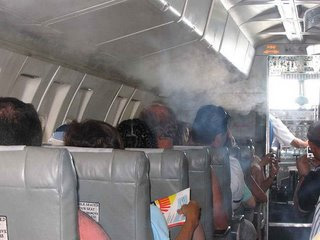Inside Washtenaw County Public Health: Fight for your right to live and breathe smoke free!

DeBorah Borden, Tobacco Use Prevention Coordinator, Washtenaw County Public Health. | Photo by Julie Stafford
In dealing with the public's concern about smoke-filled air, I sometimes receive calls from individuals living in multi-unit dwellings (apartments, condominiums and/or townhouses). The complaint usually centers on a neighbor's smoke that has infiltrated their living environment. Not too long ago, a young college student contacted me with just that complaint.
The neighbor above her was a smoker, and smoke was entering her apartment through the adjoining ventilation system. The young lady suffered from asthma and was constantly having to use her inhaler to combat her respiratory ailments due to her exposure to lingering smoke. Her complaints to the apartment management basically fell on deaf ears. The only solution they offered her was to move to another apartment unit. The problem with this proposal was she could inherit another smoking neighbor, which would place her in the same dilemma.
When asked if she could be released from the lease agreement, management said no, not without penalty — which meant she would be responsible for the lease expense until they found a new tenant. Unfortunately this young lady had no other recourse but to stay in her unit and suffer with her worsened asthma until her lease expired.
This scenario is more common than we think.
There are many individuals with respiratory ailments that suffer needlessly from secondhand smoke exposure. In Michigan, secondhand smoke kills 2,500 people a year. Fortunately, there is a solution to this problem. There is a movement across the state to encourage property owners to make some or all of their properties smoke-free.
The Washtenaw County Public Health Department is involved in a two-year grant; the Michigan Smoke Free Apartment Initiative, from the Tobacco Section of the Michigan Department of Community Health. Its purpose is to increase the number of smoke-free public and affordable housing units in Washtenaw County.

photo courtesy of www.smokefreeforme.org
Currently, only 9 percent of property owners in Washtenaw County enforce smoke free policies. This figure is in contrast with what most residents seem to want. In 2005, Michigan conducted the Michigan Adult Tobacco Survey, and more than 80 percent of households surveyed said they have some type of no smoking policy for their homes, meaning those who smoke are smoking outside the home to protect the health of their families.
The Washtenaw County Public Heath Department strongly supports the goal of protecting people in both multi-unit and affordable housing from secondhand smoke. In July of 2010, property owners and local housing authorities were invited to attend an educational presentation titled Clearing the Air: Smoke Free Housing. The presentation provided information on the rights of property owners to implement a smoke-free policy, the economic and health benefits, and the legal and technical assistance available for support. On-going discussions are being held with both the Ypsilanti and Ann Arbor Housing Authorities, and smoke-free housing promotional materials, such as brochures and flyers, are available to property owners, housing authorities and the public.
Benefits of smoke-free housing
The trend toward smoke free housing is becoming more viable as landlords, condominium owners and housing authorities learn more about the health and financial benefits of smoke-free homes, particularly multi-unit homes. Because these homes are adjacent to one another, secondhand smoke can infiltrate another person's home in a variety of ways — poor ventilation, windows, doors, shared air space and holes. Research has shown that as much as 65 percent of air can be exchanged between units. Landlords are all too familiar with the high maintenance cost associated with rehabbing a home previously occupied by a smoker — cigarette burn marks, nicotine and tar-stained walls and smoke-drenched window treatments can cost a property owner anywhere between $600 and $6,000. Let's not forget the possibility of cigarette-caused fires, which can be devastating to tenants and property owners.

Entrance to the Washtenaw County Public Health department. | Photo by Julie Stafford
As the public becomes more aware of the dangers of secondhand smoke, the demand for smoke-free housing is increasing. Property owners and housing commissions can adopt smoke free policies. Smoking is not a protected class - there is no state, federal, or local law that established the right to smoke. Smoke-free housing is legal, and it makes good business sense.
The Great American SmokeOut is Thursday, Nov. 18.
So what better time to show support for smoke free housing?
Many of us remember the days when nonsmoking airplane passengers had no choice but to breathe clouds of smoke as other passengers lit up cigarettes in the next row.

1973: No-smoking sections introduced.
1988: No-smoking on all U.S. domestic flights under two hours.
1990: No-smoking on all U.S. domestic flights under six hours.
1998: No-smoking on all U.S. domestic flights.
And it wasn't too long ago that restaurant patrons smelled acrid tobacco smoke along with their meals, and many employees in shared workspaces had to share air clouded with secondhand smoke. Tobacco smoke is a health hazard to all individuals, but there are populations that are especially vulnerable — small children, seniors and those with respiratory issues.
For children, secondhand smoke can increase the likelihood of developing asthma, bronchitis, pneumonia, ear infections, poor lung development and other respiratory ailments. Secondhand smoke has also been associated with Sudden Infant Death Syndrome. Senior citizens suffer from many debilitating/ailing diseases, such as cancer, stroke and heart/cardiovascular disease. These illnesses are strongly associated with tobacco use and can be exacerbated by secondhand smoke exposure.
For more information and to access a listing of smoke-free apartments/housing, visit http://www.mismokefreeapartment.org.
The Michigan Smoke Free Apartment Initiative is a partnership of the Washtenaw County Public Health Department, the Michigan Department of Community Health/Tobacco Section and the Smoke Free Law Environments Project.
For questions concerning the Michigan Smoke Free Housing Initiative contact DeBorah Borden at bordend@ewashtenaw.org. or at 734-544-6874.

